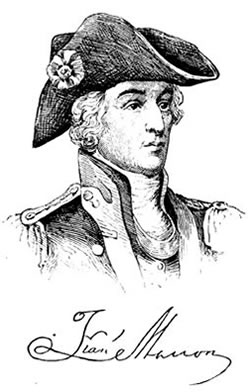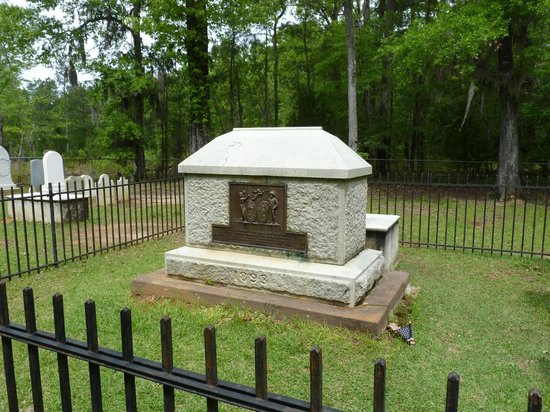Francis Marion was a military officer in the American Revolutionary War. He became one of the most popular characters in the war, especially in the South.

Marion was one of the first to employ guerrilla tactics against the British and became one of the founders of guerrilla warfare. Marion is considered to be the father of modern guerrilla warfare and maneuver warfare. He is also considered to be the father of the United States Army Rangers.
Jump to:
Francis Marion Facts: Early Years
There is not a lot of information about Francis Marion in his former years, but we do know that was born in Berkeley, South Carolina, in 1732
At 15 years old, he boarded a ship to the West Indies but met disaster when the ship sank, and Marion spent a week at sea.
When he returned home, he learned about the family business and eventually managed the family plantation.
Marion's family owned many slaves
In 1757, Marion was recruited to become a soldier in the British Army against the French.
He served in the French and Indian War during a campaign to defeat the Cherokee. This is where he first cut his teeth in guerrilla warfare.
Francis Marion Facts: American Revolutionary War
On June 21, 1775, Marion was commissioned Captain in the 2nd South Carolina Regiment under William Moultrie, with whom he served in June 1776 in the defense of Fort Sullivan in Charleston harbor.
In September 1776, the Continental Congress commissioned Marion as a Lieutenant Colonel. In the autumn of 1779, he took part in the siege of Savannah, a failed Franco-American attempt to capture the Georgia city.
A British expedition under Henry Clinton moved into South Carolina in the early Spring of 1780 and laid siege to Charleston. Marion was not captured with the rest of the garrison when Charleston fell on May 12, 1780, because he had broken an ankle in an accident and had left the city to recuperate.
Clinton took part of the British army that had captured Charleston back to New York, but a significant number stayed for operations under Lord Cornwallis in the Carolinas.
After the loss in Charleston, the defeats of General Isaac Huger at Moncks Corner and Lieutenant Colonel Abraham Buford at the Waxhaw massacre, Marion organized a small unit, which at first consisted of between 20 and 70 men and was the only force opposing the British Army in the state. At this point, Marion was still nearly crippled from the slowly healing ankle.
Francis Marion joined Major General Horatio Gates just before the Battle of Camden, but Gates had no confidence in him and sent him to take command of the Williamsburg Militia in the Pee Dee area.
Gates asked him to undertake scouting missions and to impede the expected flight of the British after the battle. Marion thus missed the battle, which proved to be a decisive British victory.
Marion showed himself to be a singularly able leader of irregular militiamen and ruthless in his actions against Loyalists.
Unlike the Continental troops, Marion's Men, as they were known, served without pay and supplied their own horses, arms, and often their food.
Marion rarely committed his men to frontal warfare but repeatedly surprised larger bodies of Loyalists or British regulars with quick surprise attacks and equally quick withdrawal from the field.
After the surrender of Charleston, the British garrisoned South Carolina with help from local Tories, except for Williamsburg, which they were never able to hold.
The British made one attempt to garrison Williamsburg at the colonial village of Willtown but were driven out by Marion at the Battle of Black Mingo.
Cornwallis observed, "Colonel Marion had so wrought the minds of the people, partly by the terror of his threats and cruelty of his punishments, and partly by the promise of plunder, that there was scarcely an inhabitant between the Santee and the Pee Dee that was not in arms against us"
Colonel Banastre Tarleton was sent to capture or kill Marion in November 1780; he despaired of finding the "old swamp fox," who eluded him by traveling along swamp paths.
It was Tarleton who gave Marion his nom de guerre when, after unsuccessfully pursuing Marion's troops for over 26 miles through a swamp, he gave up and swore: "As for this damned old fox, the Devil himself could not catch him."
Once Marion had shown his ability at guerrilla warfare, making himself a serious nuisance to the British, Gov. John Rutledge commissioned him a brigadier general of state troops.
Marion was also tasked with combating groups of freed slaves working or fighting alongside the British. He received an order from the Governor of South Carolina to execute any blacks suspected of carrying provisions or gathering intelligence for the enemy "agreeable to the laws of this State."
When Major General Nathanael Greene took command in the South, Marion, and Lieutenant Colonel Henry Lee were ordered in January 1781 to attack Georgetown but were unsuccessful. In April, they took Fort Watson, and in May, they captured Fort Motte and succeeded in breaking communications between the British posts in the Carolinas.
On August 31, Marion rescued a small American force trapped by 500 British soldiers under the leadership of Major C. Fraser. For this action, he received the thanks of the Continental Congress. Marion commanded the right wing under General Greene at the Battle of Eutaw Springs.
Francis Marion Facts: Later Years
Marion returned to his plantation to find it had been burnt during the fighting. His slaves had run away to fight for the British and had later been evacuated from Charleston. He had to borrow money to restock his plantation with slaves.
After the war, Marion married his cousin, Mary Esther Videau. His nephew Theodore had hinted to his uncle that it was time to get married.
His relatives and friends informed him that Mary always listened with glowing cheeks and sparkling eyes when anyone began reciting the exploits of the Swamp Fox.

